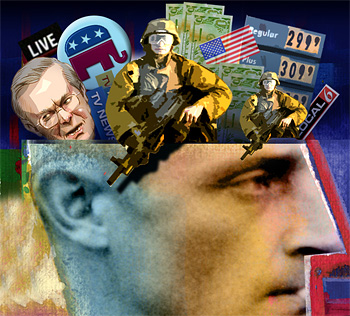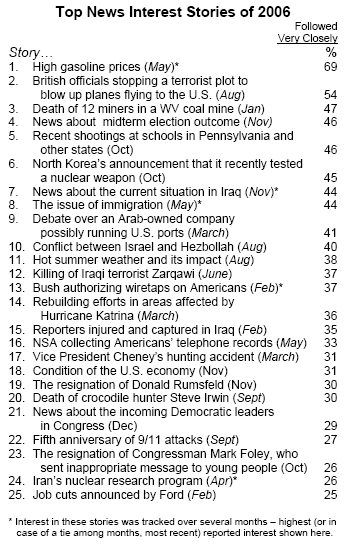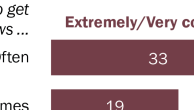by Jodie T. Allen and Carroll Doherty

Once again, public opinion played a major role in the most important news stories of the year. Some of the strongest 2006 trends in public opinion carried over from previous years — notably growing concern about the Iraq war and mounting dissatisfaction with the performance of the Republican-controlled Congress. In the case of another continuing story, the succession of scandalous revelations involving lobbyists, members of Congress and other high-profile figures, intense media coverage failed to ignite immediate public outrage, but its cumulative effect was nonetheless apparent on election day.
Economic issues — especially a sharp rise in gasoline prices during the first several months of the year — remained high on Americans’ worry list, and the public seemed immune to cheerier economic indicators, including receding prices at the pump and a booming stock market.
Notable new stories also attracted considerable attention. These include: such happenings as Vice President Cheney’s accidental shooting of a fellow hunter, the proposed takeover of U.S. port facilities by a Mideast emirate and the death of miners trapped in a West Virginia coal mine.
Then there were those stories where, despite headline coverage, the public appeared unmoved — the dogs that didn’t bark, at least as loudly as one might have expected. Immigration, for example, spiked in the zeitgeist during May’s demonstrations but it faded quickly in the public mind and appeared to exert little influence on the fall elections. Nor did once hot-button social values issues, such as gay marriage and abortion, play the important role they did in other recent years. And despite the hoopla surrounding its release in early December, the Iraq Study Group’s report scarcely registered with most Americans.
To capture these divergent measures, the Pew Research Center has compiled three separate lists: the top ten stories in which public opinion played a significant role, the most notable “non-barking dogs,” and the traditional Year-End News Interest Index listing the stories most closing watched by the public over the course of 2006.
Top Ten Public Opinion Stories of 2006
1. A National Wave Still Matters… If It’s Strong Enough. All year, Democrats held sizable and consistent leads in the so-called generic House ballot derived from national samples of prospective voters. Yet Republicans still held out hopes their carefully constructed electoral seawall — safe seat redistricting — would enable them to survive with their congressional majorities, albeit with diminished margins, intact. But the tide was too high: Democrats, helped by the shifting sentiments of independents and moderates, won by seven points in the popular vote for the House, more than enough for them to take control. Still, the results suggest that gerrymandering provided some cushion for incumbents: This year, Democrats garnered at least as great a percentage of the popular vote as did Republicans in 1994, and won the same number of seats as did the GOP 12 years ago. However, fewer incumbents lost their seats in ’06 than in 1994 despite comparable levels of discontent with Washington. See The Real Message of the Midterms.
2. Deepening Gloom about Iraq. Throughout the year, the public increasingly came to the view that the situation in Iraq was deteriorating by the day. By December, half of Americans expressed the view that the war in Iraq will turn out to be another Vietnam, while just a third thought the U.S. will accomplish its goals there. As recently as April, opinion on this issue was evenly divided. Currently, disapproval of President Bush’s handling of the situation in Iraq has spiked, rising to 71% from 61% in August and 58% last December. But no real consensus emerged about what to do next. Still, the number of Americans who believe the U.S. should set a timetable for the withdrawal of American troops from Iraq is at an all-time high (58%); as recently as September, the public was roughly split on this issue.
3. A Nation Addicted. Gas prices dominated the public’s attention — as long as they were on the upswing. In February, fully 85% of the public agreed with President Bush assertion in his State of the Union address that the U.S. is addicted to oil. But many are skeptical that America can wean itself from foreign oil within the next two decades. Half of the public saw the U.S. ending reliance on foreign oil within the next 20 years, while 42% said we could not. Public attention to the issue remained high — in early May, 69% of the public said they were following news stories about high gasoline prices very closely, as did 60% in August.
4. No Port in a Storm. Do Americans really care if a foreign firm manages port facilities in the U.S.? It turns out they care passionately — if the foreign firm in question is headquartered in Dubai, in the United Arab Emirates. The backlash over the proposed ports deal in March surprised the Bush administration, drove the president’s approval rating to 33% (a new low at the time), and made even the much-maligned Congress look good: 58% said lawmakers did the right thing in strenuously opposing the deal.
5. Stockpiling Scandal. Public outrage was slow to ignite over improper dealings between lobbyist Jack Abramoff and key members of Congress (see below) and even the resignation of GOP Rep. Mark Foley, following his admission that he had sent sexuality explicit messages to congressional pages, did not appear immediately to change voter perceptions about which party would do a better job of improving the nation’s morals. Still, the steady accretion of disturbing details – the resignations of House Majority Leader Tom DeLay and Republican Reps. Randy “Duke” Cunningham, Robert Ney and Foley, and revelations about a prominent evangelical leader’s meetings with a male prostitute — took its toll on the GOP. Two weeks before the midterms, a Pew survey found the perception that Democrats are better positioned to reform the government in Washington was especially common among two crucial swing constituencies: voters in competitive House districts and independents. More exit poll respondents rated corruption and scandals as “extremely important” than said this about any other single issue. But in Pew’s post-election survey, when asked to choose the “most important” issue, respondents placed corruption far behind the Iraq war.
6. Good News Is No News. Even as gas prices retreated, inflation subsided, unemployment remained mostly stable and stock markets headed for end-of-year record highs, the public remained dubious about the strength of the U.S. economy. In December only 38% of Americans rated economic conditions as excellent or good, in line with public views earlier in the fall; about half the public (49%) said jobs are difficult to find. Still, the number saying jobs are plentiful in their own localities rose to 40%; in January only a third had an upbeat view of the local job situation. About half of Americans (48%) rate their own financial situation as good or excellent and two in three expect at least some improvement in their finances in the coming year. But an undercurrent of unease persisted: A mid-year Pew survey found only 49% of Americans saying they expect their quality of life to be higher five years from now, down from 61% in 2002. Fully 77% felt that increased outsourcing has hurt American workers while 31% thought their own job could be done by someone outside the country.
7. Tragedy in West Virginia… Even in a month when many happenings competed for attention — the Bush administration’s authorizing warrantless wiretaps on Americans, events in Iraq, the Supreme Court nomination of Samuel Alito and the Abramoff scandal — the public’s attention focused most closely on the deaths of 12 miners trapped in a West Virginia coal mine and the rescue of many of their comrades. Fully 80% of those surveyed said they followed the story either very closely (47%) or fairly closely (33%).
8. …And Farce in Texas. Both the media and the public found it hard to resist the story of Vice President Cheney’s quail hunting mishap in which he accidentally fired birdshot into the face and chest of a fellow hunter and campaign contributor. Even a month later in March, 63% of the public said they were following the story either very closely (31%) or fairly closely (32%). The number of Americans holding at least mostly favorable views of the vice president fell to 36% in April (down from 48% in the spring of 2005) and remained at 35% as the year closed.
9. Still a Special Relationship. Public support for Israel remained strong in the face of Israel’s massive military strikes against Hezbollah forces in southern Lebanon. An August Pew survey found that overall public support for Israel was even greater than before its cross-border offensive against Hezbollah militants with 52% saying they sympathize with Israel in its dispute with the Palestinians, up from 44% in July. More than three times as many blamed Hezbollah for the outbreak of violence in Lebanon as blamed Israel (by 42% to 12%). But while 29% said Hezbollah was most responsible for civilian casualties, almost as many (21%) blamed Israel. The conflict attracted unusually high public interest for an overseas story not directly involving the U.S. or Americans with four-in-ten Americans saying they were following the conflict very closely.
10. Newspaper Blues. These are not good times for the nation’s newspapers: The publisher and the top editor at the Los Angeles Times resigned rather than make staff cutbacks, layoffs hit several major newspapers, and the future looks no better. Pew found that online newspapers offer a ray of hope, but a fairly dim one.
Dogs That Didn’t Bark in 2006
An Unread Report. Despite deep public dissatisfaction with the Iraq war, the highly anticipated report by a bipartisan panel proposing new policy options for Iraq did not register strongly with most Americans. Only about half say they heard even a little about the report released last week by the Iraq Study Group led by James Baker and Lee Hamilton, while about as many (47%) say they heard nothing at all about the group’s recommendations.
Immigration Indifference. Pew’s tracking of the country’s attitudes toward immigration found concern peaking in May, around the time of demonstrations by supporters of liberalized immigration laws and the attendant backlash. That month, 10% of those surveyed rated immigration the top problem facing the nation, up from 4% in March, while 44% said they were following the story very closely. But interest in the issue quickly faded. While immigration was rated “extremely important” in the exit poll by 30% of voters on Election Day, just 7% picked it as most important in Pew’s post-election poll, and just 4% mentioned it as one of the top issues in an open-ended version of the question.
No Terrorism Panic. Related overseas events continued to garner broad public attention — 54% of the public said they were following news about a reported terrorist plot against U.S. trans-Atlantic jet liners and interest remained high in the ongoing violence in Iraq and the July-August war in Lebanon. But there was little evidence that these dramatic stories materially changed public attitudes. In particular, an August survey found no surge in worries about another terrorist attack on the United States.
Death in Darfur. Despite frequent reports of continuing atrocities, public interest in the humanitarian crisis in the Darfur region of Sudan remained relatively modest. In December, just 13% of Americans said they followed news about ethnic violence in Darfur very closely, about the same number recorded last May and in July 2004. By contrast, more than three times as many people (42%) said they paid very close attention to news about the situation in Iraq. Nonetheless, about half of Americans (53%) favor the use of U.S. troops — as a part of a multinational force — to help end ethnic genocide in Darfur. This was especially true of those whose attention has been drawn by news reports: Among those who have followed reports on Darfur at least fairly closely — slightly more than a third of the public — two-thirds (66%) favor the use of U.S. troops.
Gay Marriage’s Blunted Edge. While only 35% of Americans favor marriage between same sex couples a Pew poll found that a 54% majority now favors allowing gay and lesbian couples to enter into legal agreements giving them many of the same rights as married couples — a figure nine percentage points higher than in October 2003. Only 30% of the public supports a constitutional amendment to ban marriages between gay and lesbian couples. Nor was there much evidence that this was an overriding concern for most voters. The cluster of “social value” issues was rated as “extremely important” by 36% of voters in the Election Day exit poll, about the same as the war in Iraq. However, in Pew’s post-election poll, just 16% chose it as most important from a list (27% did so when they were offered a chance to choose more than one issue). And just 5% mentioned social value issues in the open-ended version of the question.
Yawning at Abramoff. Despite intensive media coverage, revelations about improper dealings between lobbyist Jack Abramoff and key members of Congress failed to ignite public outrage — in January only 18% of the public said they were following the story closely. And by June, even after additional revelations of bribery and other misbehavior by members of Congress, only 14% of adult Americans said they were following stories about financial links between lobbyists and Congress very closely. Still, as noted earlier, by fall the steady drip-drop of scandal had further dampened voters’ enthusiasm for their incumbent representatives in Washington.
Relief at the Pump. Politicians may have heaved a sign of relief come September as gas prices retreated from their mid-summer highs, but the public wasn’t ready to credit them for any reduced pain at the pump. On the eve of the election, a Pew poll found three-in-four Americans saying they talked “frequently” about gas prices with their friends and family, making gasoline a far more frequent topic of conversation than the war in Iraq, the economy or education (all three tied at 54%). Nor was there a significant difference in frequency of discussion between those who planned to vote Republican and those who leaned Democratic.
No Coup for Couric. Despite an unprecedented buildup for Katie Couric’s debut as anchor of the “CBS Evening News,” public interest remained restrained. In April, when the news that she was leaving the Today Show for CBS, only 12% of the public said they were following the story very closely. An August survey found Couric was more widely known that her soon-to-be competitors at NBC and ABC. Still, only about a third of the public (35%) could identify her as CBS’s soon-to-be anchor, far fewer than the 69% who correctly identified Mel Gibson as the Hollywood actor who had made anti-Semitic remarks during a recent drunk driving arrest. Couric’s early September debut brought her top ratings in the evening news slot, but by year’s end, CBS had retreated to its pre-Couric third-place standing.
The News Interest Index for 2006
No natural disasters, such as Hurricane Katrina or the Indian Ocean tsunami galvanized the public as they did in 2005. Instead, a perennial concern of the American public — high gasoline prices — topped the list of stories claiming the most interest in 2006. While gas prices drew close attention throughout much of the year, interest peaked in May, at the start of the summer driving season when nearly seven-in-ten Americans said they were paying very close attention to the story.

More foreign-based stories drew intense interest than in the preceding year. Terrorism again claimed a high place on the news interest list, with reports that British officials had foiled a plot to blow up transatlantic flights claiming close attention among 54% of the public in August. Other prominent overseas happenings included North Korea’s nuclear test announcement (45% watching very closely in October), continuing attention to the situation in Iraq (peaking most recently at 44% in November), the conflict between Israel and Hezbollah (40% in August), the killing of Iraqi terrorist Zarqawi (37% in June) and news of reporters injured and captured in Iraq (35% paying very close attention in February). Iran’s nuclear program weighed in at No. 24 on the list, with 26% of the public following it closely in April. And another story with foreign overtones — the possible takeover of some U.S. port facilities by an Arab-owned company drew intense interest among 41% of Americans in March, nearly as many those who focused on the controversy over immigration in May.
The outcome of the November midterm elections ranked No. 4 on the close-interest list (46% of the public tracked the results intently). But the death of 12 miners in a West Virginia coal mine outranked it, claiming the No. 3 place with 47% tracking the story very closely in January.
Other single event stories attracting widespread attention included shootings at schools in Pennsylvania and elsewhere (46% in October), and, farther down the list, Vice President Cheney’s hunting accident (31%), the resignation of Defense Secretary Donald Rumsfeld and the death of crocodile hunter Steve Irwin.
Hurricane Katrina’s aftermath continued to engage substantial public interest as did reports about the condition of the U.S. economy and, specifically, job cuts announced in February by Ford Motor Co.
Despite extensive media coverage, the only scandal-related story making the top 25 on the News Interest index for 2006 was the resignation of Rep. Mark Foley, following his admission that he had sent improper messages to congressional pages.




